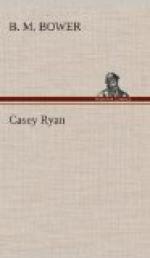You’re thinking about Juan, I know. Well, Casey thought of Juan the first day, and took the trouble to hunt him up and hire him to herd the goats. But Juan developed a bad case of sleeping sickness, Casey says, which unfortunately was not contagious to goats. He swears that he never saw one of those goats lying down, though he had seen pictures of goats lying down and had a vague idea that they chewed their cuds. Casey tried to be funny, then. He looked at me and grinned, and observed, “Hunh! Goats don’t chew cuds. That’s all wrong. They chew duds. You ask anybody in Patmos.” So Juan slept under sagebushes and grease-wood, and the goats did not.
Casey declares that he stood it for two weeks, and that it took all he could make in the garage to pay the six families of Patmos for the damage wrought by his security. He lost fifteen pounds of flesh and every friend he had made in the place except the man who hauled water, and he liked it because he was getting rich. Once Casey had a bright idea, and with much labor and language he loaded the goats into the trailer and had the water-hauler take them out to the hills. But that didn’t work at all. Part of the flock came back afoot, from sheer homesickness, and the rest were hauled back because they were ruining the spring which was Patmos’ sole water supply.
Casey would have shot the goats, but he couldn’t bring himself to do anything that would offend J. Paul Smith of the Vista Grande Rancho. Whenever he read the letter J. Paul Smith had written him he was ashamed to do anything that would lower him in the estimation of J. Paul Smith, who trusted him and took it for granted that he would do the right thing and do it with enthusiasm.
“If he hadn’t wrote so dog-gone polite!” Casey complained to me. “And if he hadn’t went an’ took it for granted I’d come through. But a man can’t turn down a feller that wrote the way he done. Look at that letter! A college perfessor couldn’t uh throwed together no better letter than that. And that there ’Thanking you in advance’—a feller can’t throw a man down when he writes that way. You ask anybody.” Casey’s tone was one of reminiscent injury, as if J. Paul Smith had indeed taken a mean advantage of him.
One day Casey reached the limit of his endurance,—or perhaps of the endurance of Patmos. There were not enough male residents to form a mob strong enough to lynch Casey, but there was one woman who had lost a sofa pillow and two lace curtains; Casey did not say much about her, but I gathered that he would as soon be lynched as remonstrated with again by that woman. “Sufferin’ Sunday! I’d shore hate to be her husband. You ask anybody!” sighed Casey when he was telling me.




